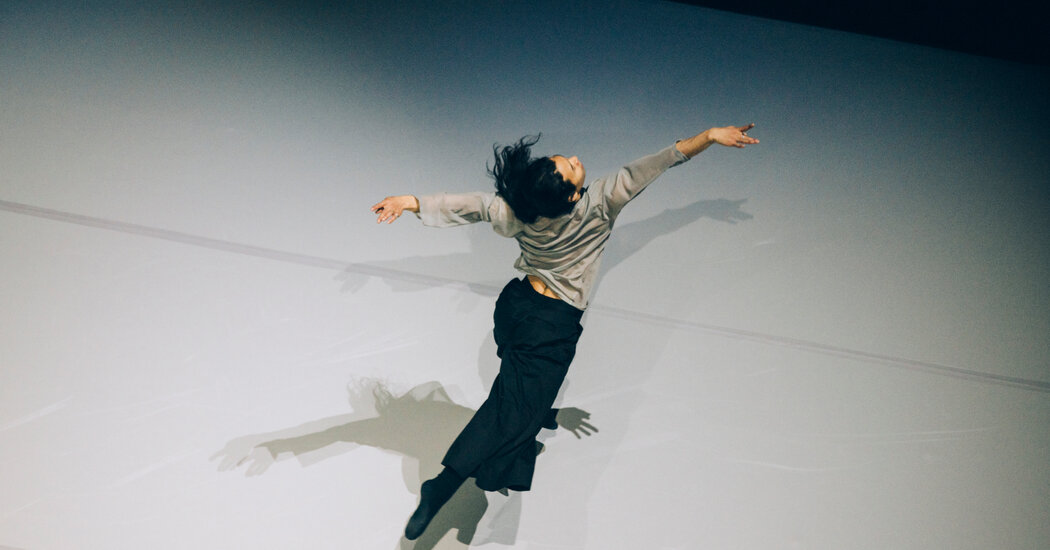The choreographer Benjamin Millepied is a protean figure. The founder of the L.A. Dance Project, he has been a principal dancer with New York City Ballet, the director of the Paris Opera Ballet, a filmmaker and a perennially well-connected catalyst for adventurous collaborations with figures from the worlds of fashion, movies, music and dance.
Recently relocated to Paris from Los Angeles, Millepied has not — heaven forfend — been idle. He has, with Solenne du Haÿs Mascré, started the Paris Dance Project, not a company, but an umbrella for choreographic and educational initiatives; he continues to run the L.A. Dance Project; and he hasn’t stopped choreographing.
His new work, “Me. You. We. They” — in which he made a surprise appearance as a dancer — is the seventh that he has created with the composer Nico Muhly, and it was the concluding piece on the program “Benjamin Millepied & Nico Muhly,” performed by L.A. Dance Project, which opened on Friday at the Philharmonie de Paris.
Millepied’s first theatrical offering since returning to France, the program is a clever choice for the Philharmonie. The concert hall, designed by Jean Nouvel, opened in 2015 in a traditionally working-class neighborhood amid heated debate about its location — Would classical music attendees go to the outskirts of Paris? Would a new audience come? — as well as cost overruns and Nouvel’s very public unhappiness with the finished building.
But the Philharmonie is generally considered a success, partly because it has tried to appeal to a diverse public with offerings beyond the classical music sphere. The Muhly-Millepied program fits perfectly: Muhly writes serious contemporary music, accessible and youthful, and it doesn’t hurt that Millepied is a big name in his native France. (The large hall, with 2,400 seats, was almost sold out for the four-show run, which ended on Sunday.)
The hall’s acoustics are fabulous for the Muhly scores, stirringly played by the ensemble Le Balcon and sensitively conducted by Maxime Pascal. The surprise is how well the space works for dance despite no proscenium to hang lights from, or wings for the dancers to disappear into.
At least it works for this kind of minimally accessorized dance, an aspect Millepied emphasized by keeping the performers in the same eclectically casual costumes (by Camille Assaf) across the three pieces on the program: “Triade” (2008), “Moving Parts” (2012) and the new work. The costuming lends a unity to the evening, but also a sameness, particularly since “Triade” and “Moving Parts” both have a loose-limbed playfulness and brief encounter interactions.
“Triade,” made for the Paris Opera Ballet, was commissioned as part of a homage to Jerome Robbins, a strong influence during Millepied’s ballet career. It’s full of deliberate references: the four dancers (Naomi Van Brunt, Lorrin Brubaker, Daphne Fernberger and David Adrian Freeland Jr.) enter casually, like the walking crowd in “Glass Pieces,” brush up against one another with the playful, teasing quality of “Interplay” or “Fancy Free,” and part after exchanging partners, as in “In the Night.”
But the work has its own inner world, even if the dramatic intensity I remember at the Opera has modulated into a more neutral suggestion of stories and possibilities as the dancers leap, turn and skid to the floor, feinting around one another, testing each other’s limits.
“Moving Parts,” performed by six dancers in front of and between movable panels with bold calligraphic flourishes by the artist Christopher Wool, has some choreographic and compositional high points (notably Muhly’s use of the organ, played here by Alexis Grizard). But it rambles in between the standout opening solo of high-speed turns and sudden slowings for the quicksilver Shu Kinouchi, and a tender male duet toward the end.
Millepied feels like a freer, more exploratory choreographer in “Me. You.,” which features 10 dancers and a musical ensemble of 15 performing Muhly’s new “One Speed, Many Shapes,” a pulse-driven array of soundscapes.
The choreographic DNA remains consistent. There are lots of high, swooping, circling legs as dancers revolve around one another, along with loose, flung-away limbs, nimble footwork and complex, reflexive interactions between fast-moving bodies. (Millepied’s movement is way more difficult than these terrific dancers make it look.) Fast movement is often set against slow music, and vice versa.
But in the new piece, essentially a series of solos, duos and trios, the often-gestural, fresh quality of the dancing feels more personal to the dancers than the vocabulary of the first two works, and less packed with movement. Here, bodies curve around one another with a magnetic pull in an opening duo; a man and woman slowly reach into space; a virtuosic male trio carves shapes into the air.
Millepied’s duet with Eva Galmel, set to low chimes and flute, is lovely, all quick reactive alertness, limbs flicking between close-knit dartings, testing equilibrium and momentum, entwining and pushing away.
The personal, idiosyncratic quality of the movement doesn’t always work; a brief ensemble section midway through just looks incoherent. But “Me. You.” is mostly compelling both musically and choreographically, with a marvelous final sequence that has individual dancers standing still in turn as the others move with sweeping intensity to the propulsive music. The final moment echoes the start of the piece: A lone dancer faces the audience, while the others face the musicians — a fitting image for partners in sound and space.
“Benjamin Millepied & Nico Muhly”
Performed through March 31 at the Philharmonie de Paris, philharmoniedeparis.fr.
